
hill_l_a_stories_for_reading_comprehension_1
.pdf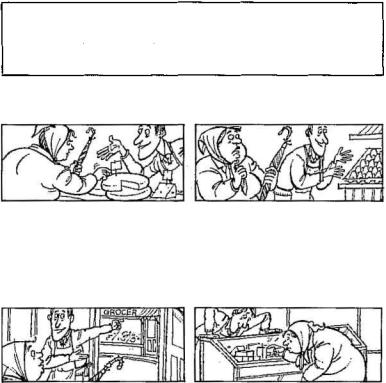
 UNIT 3
UNIT 3
The (food/milk) came to Alan's shop in a truck. Alan's wife (did not work/worked) with him. (Alan and his wife were/Alan's food was) good and clean. A fat woman came into the shop. Alan's wife was unhappy because she (asked a question/was fat). (Alan's wife/Alan) answered the question. The food in the shop was (cheaper/dearer) on Saturday and Sunday.
Exercise 3
Use any in questions (e.g. "Have you got any butter?") and in negative statements (e.g. "We haven't got any butter."), but use some when there is no question and no negative (e.g. "We have got some butter.").
Put some or any in the empty places:
1 "Have you got . . . hard cheese?"
"No, we haven't got . . .
hard cheese, but we have got ... . nice soft cheese."
3 "You haven't got . . .
fruit."
"No, we don't have . . . fruit here, but there are . . . oranges and apples in that shop."
2 "I want . . . eggs. Have you got . . . brown ones?" "Yes, we have got . . . nice brown ones."
4 "Have you got . . . milk?" "We haven't g o t . . . milk now, but we're going to have , . . bottles this afternoon."
11
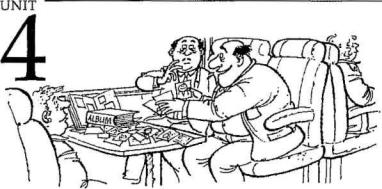
Mr and Mrs Brown had two daughters and two sons. Both the daughters married, and then both the sons married too. Soon Mr and Mrs Brown had a granddaughter, and then they had two grandsons. They were very happy.
Then one of their daughters had another baby, and she telephoned her mother, "Please come and help with your new granddaughter." Mrs Brown went quickly, but Mr Brown stayed at home, because he was nearer his job there. But he said, "I'll come on Friday evening, and I'll stay till Monday morning."
On Friday evening, after work, Mr Brown got into a train. He was very happy. "I'm going to see my new granddaughter now," he said.
There were three empty places in the train. There was an old man beside one empty place, and Mr Brown went to him and said nicely, "Are you a grandfather?"
"Yes," the man answered, "I have three granddaughters." Mr Brown went to the second empty place. There was a nice woman beside that. Mr Brown said to her, "Are you a
grandmother?"
The woman answered, "Yes, I have two granddaughters and two grandsons."
Mr Brown went to the third empty place. There was a man beside that, and Mr Brown said to him, "And are you a grandfather?"
"No, I'm not," the man answered.
Mr Brown smiled happily and said, "That's good." He sat down in the empty place and said to the man kindly, "Now I'll tell you about my granddaughters and grandsons."
12

UNIT 4
Exercise 1
Look at these questions. Find the right answers. Then write the questions and the answers:
1Did Mr and Mrs Brown have any children?
a)Yes, they had four. b) Yes, they had two.
2Did their children marry?
a)No, they did not. b) Yes, all of them did. c) Yes, two of them did.
3How many granddaughters did Mr and Mrs Brown have?
a)One. b) Two.
4Did they have any grandsons?
a) No, they did not. b) Yes, they had two.
5Who went and helped their daughter with her new baby?
a)Mr Brown did. b) Mrs Brown did.
6Did Mr Brown go with his wife?
a)No, he did not. b) Yes, he did.
7Why?
a)Because he was ill.
b)Because he had a job near his home.
8When did Mr Brown go to his daughter's house?
a) On Friday evening. b) On Monday morning.
9How did he go?
a)In a train. b) In his car.
10What did he do all the time in the train?
a)He talked about his granddaughters and grandsons.
b)He listened to stories about other people's granddaughters and grandsons.
Exercise 2
Write this story. Choose the right words each time:
Mr and Mrs Brown (did not have any/had two) daughters, (and/but) they (did not have any/had two) sons. Mr and Mrs Brown's children (did not have any/had some) children too. Mrs
13
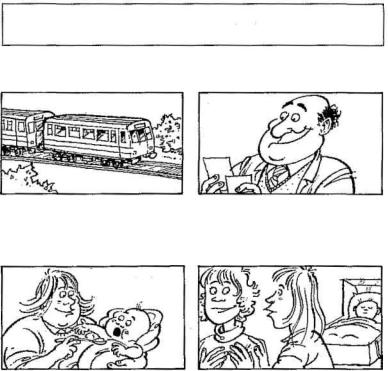
UNIT 4 
Brown (did not help/helped) one of her (daughters/sons) with (her/his) new baby. She went to her (daughter's/son's) house (with/without) her husband, because his job was (near/not near) the (daughter's/son's) house. Mr Brown (did not work/worked) on Saturday and Sunday, so he (did not go/went) to stay with his (daughter/son) then. He went in a train, and (did not sit/sat) beside another (grandfather/grandmother), because he only wanted to talk about (her/his) granddaughters and grandsons.
Exercise 3
To change an adjective into an adverb, we usually add ly
(e.g. slow, slowly).
Choose the right word each time:
1 This is a (slow/slowly) train. |
2 Mr Brown is (happily/happy). |
It goes very (slow/slowly). |
He is smiling (happily/happy). |
3 The baby is (hungrily/hungry). 4 Mrs Brown and her It is eating (hungrily/hungry). daughter must be
(quiet/quietly). They are talking (quiet/quietly).
14
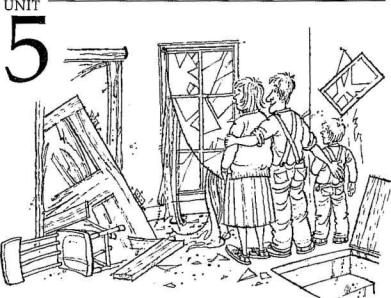
Joe was the son of a farmer. His father's farm was poor, and Joe worked on it for a long time, but then his father died, and Joe said, "I needn't stay here now. I'll sell this farm and buy one in a better place. Then I'll soon be rich."
He bought a farm in the east of the country, but then Ms new neighbours said to him, "The weather's often very bad here. The wind's very strong, and it breaks windows and doors. You must build a room under the ground, and then you and your family can go down there, and you'll be safe from the wind."
So Joe built a room under the ground. It was a lot of work, because the ground was hard.
But after that, the weather was good for a very long time. There was no wind, and Joe spoke angrily. He said, "Why did I listen to my neighbours? I didn't have to make that room under the ground. The wind never blows strongly here."
But then one day there was a very strong wind, and Joe and his family had to go down into their room under the ground. They were there for a long time. Then the wind stopped, and they came up. All the windows and doors in their house were broken.
Joe was not angry about his work now. He smiled happily and said, "Ah! I'm glad I built that room!"
15

UNIT 5
Exercise 1
Look at these questions. Find the right answers. Then write the questions and the answers:
1 What was Joe's father?
a) He was a farmer. b) He was a teacher.
2Was his father rich?
a)No, he was not. b) Yes, he was.
3Why did Joe leave his father's farm?
a)Because the wind was very strong there. b) Because he wanted a farm in a better place.
4Why did he need a room under the ground?
a)Because the doors and windows of his farm were broken. b) Because there were very strong winds in that place.
5Did the wind often blow strongly after that?
a) No, it did not. b) Yes, it did.
6Was Joe happy about that?
a)No, he was not. b) Yes, he was.
7Why did he go down into the room under the ground one day?
a)Because the weather was very cold. b) Because there was a very strong wind.
8Who went with him?
a) His family did. b) His new neighbours did.
9What did the wind do?
a)It broke the windows and doors of Joe's house. b) It went down into the room under the ground.
10Was Joe sad then?
a)No, he was happy. b) Yes, he was.
16
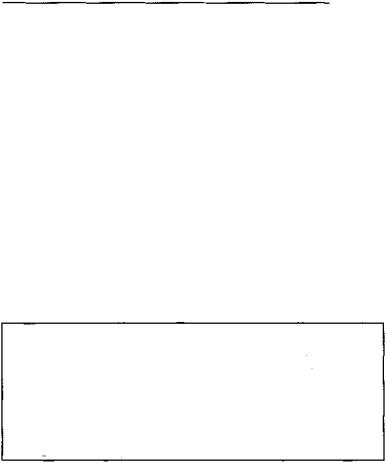
UNIT 5
Exercise 2
Write this story. Choose the right words each time:
Joe worked on his (father's/son's) farm. It was a (poor/rich) farm, because it was in a (bad/good) place. Then Joe bought (another/the) farm, and he (bought/made) a room under the ground, because his (father/neighbours) said, "The (weather/wind) can (be/blow) very (good/strongly) here, and you will not be safe in your house then." But the (weather was/wind did) not (blow/good) for a long time, and Joe was (angry/happy), because he (did not need/needed) his room under the ground, Then (the wind stopped/there was a very strong wind), and it broke the doors and windows of Joe's (house/room under the ground). He was (happy/sad) after that.
Exercise 3
Must shows obligation (e.g. "The wind is very strong, so Joe and his family must go down into the room under the ground.").
If we want to show that there is no obligation, we can use needn't (e.g. "Joe and his family needn't stay under the ground now, because the wind has stopped.").
For the past tense of must, we can use had to, and for the past tense of needn't, we can use didn't need to.
Put must, had to, needn't or didn't need to in the empty places:
Joe said, "I want to be rich, so I , . . buy a farm in a better place." He wanted to be rich, so he . . . buy a farm in a better place. Then Joe said, "I've got a lot of cows, so I . . . buy others." Joe had a lot of cows, so he . . . buy others.
17
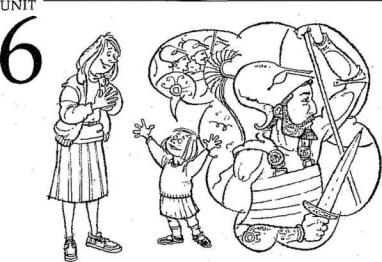
Lynn was five years old. She had a lot of little friends. They were older, and they were at school. These children told Lynn nice stories about school, so Lynn wanted to go there too.
Then one day her mother said, "You can go to school now, Lynn," and Lynn was very happy.
She was the youngest child in the school, and on the first day, her mother stayed at school with her. But on the second day, Lynn said to her, "You can go home now, Mummy."
Lynn's mother was happy, but she was sad too, because Lynn did not need her all the time now.
Lynn was very happy at school, and she learnt a lot of things there. Her mother always said, "What have you learnt today, Lynn?" and Lynn told her.
One day, Lynn came back from school and said to her mother, "Miss Richards (she was Lynn's teacher) told us some nice stories today, Mummy. The best was about Ulysses. He fought against the . . . the . . . er . . ."
"The Trojans," her mother said.
"Oh, yes, that's right," Lynn answered. "The Trojans. And then Ulysses went back in his ship with some other men. He went to see his wife . . . er . . . his wife . . ."
"Penelope," Lynn's mother said.
Lynn stopped and looked at her mother. "Mummy," she said, "has someone told you this story already?"
18

UNIT 6
Exercise 1
Look at these questions. Find the right answers. Then write the questions and the answers:
1 |
Did Lynn have any friends? |
|
|
a) No, she did not. b) Yes, she did. |
|
2 |
Did they go to school? |
|
|
a) |
No, they did not. b) Yes, they did. |
3 |
Why did Lynn want to go to school too? |
|
|
a) |
Because her friends told her nice stories about it, |
|
b) |
Because her friends were older. |
4Who was the youngest in the school?
a)Lynn's mother was. b) Lynn was.
5Did Lynn's mother stay with her?
a)No, she didn't. b) Yes, she stayed with her for one day. c) Yes, she stayed with her for two days.
6Was Lynn's mother happy or sad then?
a)She was happy. b) She was happy and sad. c) She was sad.
7 |
Who was Lynn's teacher? |
|
|
|
a) Lynn's Mummy. b) Miss Richards. |
c) |
Ulysses. |
8 |
Who fought against the Trojans? |
|
|
|
a) Lynn's Mummy. b) Miss Richards. |
c) |
Ulysses. |
9Who was Ulysses' wife?
a)Miss Richards. b) Penelope.
10Did Lynn's mother know the story about Ulysses?
a) No, she did not, b) Yes, she did.
Exercise 2
Write this story. Choose the right words each time:
Lynn's friends were (happy/not happy) at school, so Lynn (did not want/wanted) to go there too. Then one day her mother (sent/took) her to school. Her mother (stayed there/went home) on the first day, (and/but) she (stayed there/went home) on the second day. She was (happy/sad) because Lynn (did not need/needed) her at school. Lynn (always/never) told her mother about her lessons. One day she told her (a story/some nice stories) about Ulysses. She did not remember (all the/any) names. She forgot
19
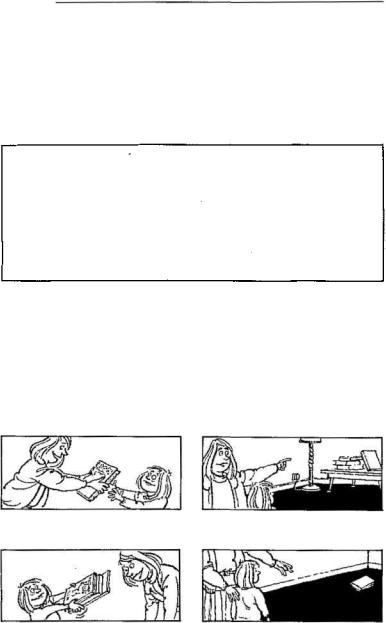
UNIT 6
the name of (Penelope's/Ulysses') wife, so her mother (asked/told) her. The story of Ulysses is a very (new/old) one, so her mother (did not know/knew) it.
Exercise 3
Most nouns form their plural just by adding s (e.g. friend, friends). But if a noun ends in a consonant + y, the y becomes its in the plural (e.g. story, stories); and if a noun ends in fe the fe becomes ves (e.g. wife, wives).
There are also some irregular plurals (e.g. child, children; man, men; woman, women).
This becomes these in the plural (e.g. this girl, these girls); and that becomes those (e.g. that bay, those boys).
Put the correct letter, or the correct ending, in the empty places:
1 The two teacher. . . told all the child. . . |
some nice |
stor. . . . |
|
2Ulysses and some other m. . .n went home to see their wi. . . .
Put that, those, this or these in the empty places:
3 Do you want . , . book? |
4 Please bring me . . . books. |
5 I like . . . books.
6 Why is , . . book on the floor?
20
